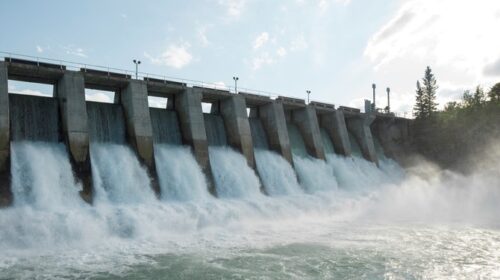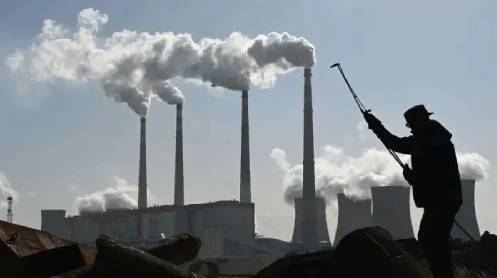The National Transmission and Despatch Company (NTDC) has prepared plans to evacuate power from three key hydropower projects, i.e., Dasu Hydropower Project (stage-1, 2160-MW), Mohmand Dam, 800-MW, and Diamer Bhasha Dam, 4500-MW, well informed sources told Business Recorder.
Total length of transmission line of Dasu hydropower project will be 254.5 km which requires 686 towers. Distance between Dasu project to 765 kV Mansehra Substation is 157 km which requires 406 towers whereas distance from Mansehra substation to Islamabad West Substation is 97.6 km, which requires 280 towers.
For 765/220 kV Mansehra (lot-III), contractors will be M/s SEPCO-1. The cost of contract will be $ 151 million which is expected to be awarded in the current month, the sources said. They added that completion period of Lot-III will be 30 months which will be completed in May 2025.
The contract of 765/500/132 kV Islamabad is under (Technical) evaluation. The engineer estimate is $ 175 million. The expected award date is February 2023. This phase will be completed in 30 months by August 2025. The project was approved by ECNEC on October 1, 2020 at a cost of $ 700 million.
According to PC-1 of 500/200/132 kV Islamabad West Grid Station (IWGS) it total cost will be Rs 8.2883 billion. World Bank approved a loan (NTMP-1) with financing amount of $ 175 million.
For 765/220 kV Mansehra Grid Station (Mot-III), two pre-qualified bidders participated in Lot-III. NTDC Board has granted approval. Pre-award negotiations were held with lowest evaluated bidder on November 2, 2022.
According to proposed interconnection of Mohmand Dam HPP (800 MW), a 220-kV Double Circuit (D/C) transmission line, approximately, 70-km long, from Mohmand Dam HPP to existing Nowshera Industrial Substation will be laid (survey & subsoil investigation completed and approved). A 220-kV D/C transmission line, approximately, 65-km long, will be laid from Mohmand Dam HPP to the planned Jamrud station (survey and subsoil investigation completed and approved). There will be two line bays each at 220-kV at Nowshera Industrial and Jamrud substations. The cost of evacuation of power from 800-MW Mohmand Dam HPP is $ 50 million. The project is expected to be completed in December 2022. Draft PC-1 has already been prepared by NTDC and shall be submitted to the GoP after confirmation of financing.
The sources said, requirement was discussed with Kuwait Fund Mission during their recent visit (October 20 to November 1, 2022), adding that NTDC request for financing arrangement has been forwarded by Ministry of Energy (Power Division) to Economic Affairs Division on October 31, 2022. EAD shall pursue Kuwait Fund in this regard.
Sharing details of evacuation scheme for Diamer Bhasha Dam HPP (4500-MW), the sources said, 2,250-MW each will be at right bank and left bank, respectively. NTDC conducted a feasibility study from 2009 to 2012, by engaging international consultants, for evacuation of power in an integrated manner from 26 hydropower projects with cumulative capacity of about 37,000-MW including Diamer Bhasha Bam, Bunji, Tungus, Yulbo, Dasu, Thakot, Pattan, Suki Kinari, Naleem Jhelum, Kohala, Karat, Azad Pattan, etc.
In the feasibility study, the Commercial Operation Date (COD) of Diamer Bhasha HPP was earlier to Dasu HPP as per information provided by Wapda.
The feasibility study proposed 500-kV transmission scheme for power evacuation of Diamer Bhasha HPP in consideration with other HPPs in Gilgit Baltistan, as well, as difficult terrain and limited right of ways for the transmission lines: (i) Diamer Bhasha (Right Bank) power station to KPK load centre along Swat River valley; and (ii) Diamer Bhasha (Left Bank) power station to Islamabad & Punjab load centres along Kunhar river valley.
Later, WAPDA decided to construct Dasu HPP earlier than Diamer Bhasha HPP. In 2017, NTDC updated the feasibility study through international consultant for power evacuation of Dasu and its downstream HPPs (proposed along Indus river valley) due to their increased generation capacities and revised CODs as communicated by WAPDA. The study was sponsored by World Bank. The study proposed 765-kV transmission scheme for power evacuation of Dasu and its downstream HPPs.
Expected COD of Diamer Bhasha Dam HPP is Feb. 2029 as intimated by WAPDA.
The re-assessment of the already proposed power evacuation schemes of 4500-MW Diamer Bhasha Darn HPP and other allied HPPs is required in view of the following : (i) Realistic corridor assessment on grounds required due to difficult terrain and very limited ROW for the transmission lines at/ around Diamer Bhasha Dam HPP & in its vicinity;(ii) some new HPPs have been proposed by PEDO along Kunhar & Swat rivers & WAPDA (Shyok) along Indus river; and (iii) possible interconnection of Diamer Bhasha Dam HPP with the planned integrated 765-kV interconnection scheme of Dasu HPP & other downstream HPPs. In view of above, the feasibility study for power evacuation of Diamer Bhasha Dam HPP is required to be updated, through consultants, in integration with other newly indicated HPPs and align it with latest development in the grid.
Feasibility study of evacuation of power from Diamer Bhasha Dam HPP and other northern HPPs will be completed in July 2024 (corridor assessment & techno-economic study). Design and engineering of transmission lines for Diamer Bhasha Dam HPP is expected to be completed by July 2025, whereas design of substation/ switching station for Diamer Bhasha Dam HPP will be completed by August 2025. PC-1 approval for power evacuation scheme for Bhasha Dam HPP will be completed by February 2026, hiring of EPC contractor for transmission line by December 2026, hiring of EPC contractor for substation/ switching station by February 2027. Construction of power evacuation scheme for Diamer Bhasha Dam HPP will be completed by August 2029.
According to sources, timelines for Diamer Bhasha HPP are subject to the timely approval of PC-I and timely provision of financing from PSDP grant to NTDC. The time variance between CoD of Diamer Bhasha Dam HPP and the completion of overall scope of work for power evacuation scheme, the delay (if any) may be covered by reducing PC-1 approval time, as well as, streamlining the design & construction of transmission line by optimizing RoW, construction activities, supply chain, etc.





